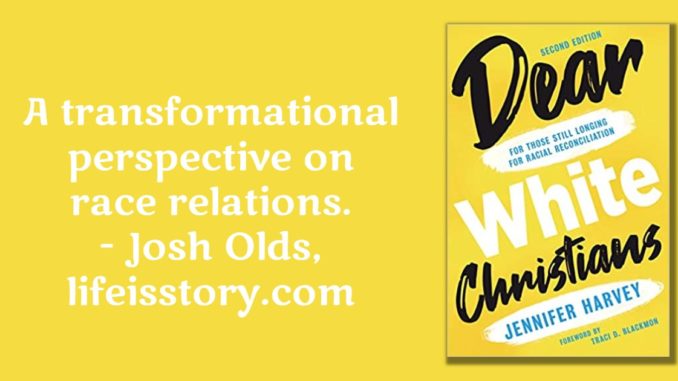
Published by Eerdmans on July 14, 2020
Genres: Non-Fiction, Racial Reconciliation
Buy on Amazon
Goodreads

“If reconciliation is the takeaway point for the civil rights story we usually tell, then the takeaway point for the more complex, more truthful civil rights story contained in Dear White Christians is reparations.” — from the preface to the second edition
With the troubling and painful events of the last several years—from the killing of numerous unarmed Black men and women at the hands of police to the rallying of white supremacists in Charlottesville—it is clearer than ever that the reconciliation paradigm, long favored by white Christians, has failed to heal the deep racial wounds in the church and American society.
In this provocative book, originally published in 2014, Jennifer Harvey argues for a radical shift away from the well-meaning but feeble longing for reconciliation toward a robustly biblical call for reparations.
Now in its second edition—with a new preface addressing the explosive changes in American culture and politics since 2014, as well as an appendix that explores what a reparations paradigm can actually look like—Dear White Christians calls justice-committed Christians to do the gospel-inspired work of opposing racist social structures around them. Harvey’s message is historically and scripturally rooted, making it ideal for facilitating the difficult but important discussions about race that are so desperately needed in churches and faith-centered classrooms across the country.
Dear White Christians is one of those books that it took me a while to get through. (My apologies to Eerdmans, who is probably convinced I forgot all about them.) In the wake of George Floyd’s murder, I made a commitment to take the work of racial reconciliation seriously and listen to voices both Christian and secular who are working and speaking in this field.
Michael Brown began my journey. Ferguson was eye-opening for me and got my attention in a way that other blatant evidences of inequality had not. Terence Crutcher was murdered three miles from my house. That brought the issue home for me. Then I adopted two children of color and the fight for equality became even more personal.
I’ve read extensively on this subject and thought I just about heard every perspective available. Then came Jennifer Harvey’s Dear White Christians. Most recent volumes on racial issues have focused on racial reconciliation. Harvey does not believe that is enough. Generations of attempt to reconcile have led to stagnation. Further, the white Christian version of reconciling looks a lot more like assimilation. Harvey argues that we must go beyond reconciliation and move toward reparations.
The first part of her book is a definition and critique of the reconciliation paradigm that has been embraced by much of the mainline and evangelical churches involved in social justice. Harvey traces the history of reconciliation attempts, noting their strengths and weaknesses, successes and failures. In the end, her conclusion is that it is simply not enough. Reconciliation is desirable, but it does not create justice. Instead, she writes, we must move toward reparation.
The second part of Dear White Christians lays the historical background of a reparations paradigm. Harvey writes about the Black Manifesto, a 1969 document written by the National Black Economic Development Conference, that first stated what a reparations paradigm would look like, asking for $500 million to be invested into the Black community in order to empower that community to economic independence. Harvey shows through this history how the goals of methods of reparation differ from reconciliation.
The sixth chapter develops Harvey’s structures of a reparations paradigm, drawing on the work that’s been done in the fifty years since the Black Manifesto. Mainly, what we see is that the work of reconciliation is personal and spiritual, but the work of reparation is communal and economic. Reconciliation is a feeling. Reparation is an action. The two work together, but reconciliation without reparation becomes assimilation.
Part three deals specifically with the history of the Episcopal Church in the area of reconciliation/reparation. Although it is interesting historically, it doesn’t mesh as well with the rest of the book or say much about what we should do not. Indeed, the appendix entitled “Now What?” is only a handful of pages. Through the history, you get a sense of what worked or didn’t work in that context, but if you are outside of that context, the content may not seem as relevant.
Overall, Dear White Christians is a challenging work. It forces readers to look at the work of racial reconciliation in a new light and strips bare the façade of assimilation that often gets promoted as reconciliation within the church. Its weakest point is its writing. Harvey is a professor of religion at Drake University and Dear White Christians is written more academically than its target audience (or, at least, those to whom the content should be targeted.) Action items get buried among pages of historical retellings and, on the whole, it’s just rather dry and slow. Harvey laboriously shows us the inadequacies of the reconciliation paradigm, but never thoroughly and concretely explains how the reparations paradigm should be constructed. Sure, there are points and action items here and there, but in the end, I’m still left with more theory than knowledge of how to move forward.
I have to give this book good marks because of its transformational perspective on race relations, but it falls short of being the kind of book that will attract, embolden, and excite the people to whom Harvey is writing.
